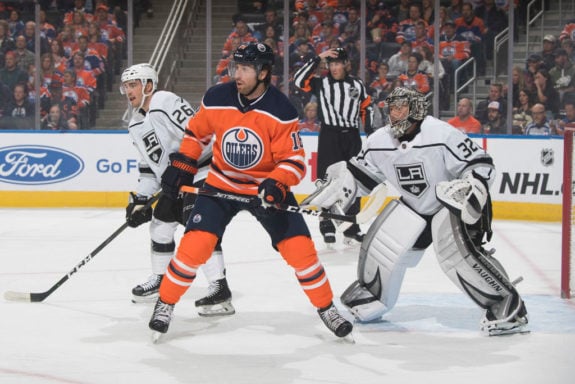Not often do trades between division rivals happen, let alone between ones as intense as the Edmonton Oilers and Calgary Flames. That is why it came as such a surprise when on July 19, 2019, when it was announced the Oilers were trading Milan Lucic and a conditional third-round pick (Flames will receive for 2021 draft) in exchange for James Neal.
At the time of the trade, Neal was just one-year into his five-year, $28.75 million deal he signed with the Flames the prior offseason. He struggled in his one and only season in Calgary, managing to put up just seven goals in 63 games, after having scored 21 or more in seven straight seasons.

Lucic on the other hand had just finished up the third year of his similarly bad seven-year, $42 million contract signed during the 2016 offseason. One benefit for the Flames in this trade in addition to the third-round pick was that the Oilers agreed to retain 12.5% of Lucic’s contract, meaning his cap hit in Calgary would be and continues to be $5.25 million per season.
Early on Reaction
Despite the Flames receiving a third-rounder and getting some salary retention, however, it seemed the vast majority believed Oilers general manager Ken Holland came out on top of this trade. That belief was only made stronger after Neal got off to an incredible start with his new team, tying his goal total from the previous season just four games into the year, and surpassing it in six.
While Neal came out flying to start the 2019-20 season, the same could not be said for Lucic who failed to score a goal through his first 27 games of the season. By the time the season was up, he had just eight goals and 20 points in 68 games while Neal had 19 goals and 31 points in 55 contests.

By the time both the season and playoffs had wrapped up, there was once again debate from both sides on who truly won this trade. That discussion heated up to a whole new degree this past Saturday when the Oilers announced they were placing Neal – who has two goals and three points in nine games this season – on waivers. Many were quick to announce that this meant the Flames were victorious in the trade between these former star players. However, when you take a deeper dive into it, it turns out to be quite the opposite.
Room for Movement
An interesting element to this 2020-21 season is the taxi squad, which allows teams to have extra players both travel and practice with the team in case an emergency call-up is needed, as bringing up players from the AHL is extremely difficult this year given quarantine protocols. Many teams are using this to their advantage to change up their lineups, often swapping players from their bottom lines on and off the taxi squad to ensure everybody is getting able to get some game action.
The Oilers are no exception to this, as many of their current bottom six in Jujhair Khaira, Tyler Ennis, Alex Chiasson, and Devin Shore have seen some time on the taxi squad this season to allow players like Joakim Nygard and Patrick Russell to be inserted into the lineup. Given the fact that Neal has now cleared waivers, he will be able to come in and out of the lineup whenever head coach Dave Tippett sees fit, which gives Edmonton even more flexibility with their forward units.

This is a luxury that the Flames do not have with Lucic, and was a major (and unknown to many) reason that the Oilers being able to move his contract at all was a big win in itself. Former general manager Peter Chiarelli elected to give the hulking forward a no-movement clause in his contract, meaning that he cannot be placed on waivers.
That isn’t the only headache Lucic’s no-movement clause causes for the Flames either, as it also has the potential to be a major issue in the upcoming Seattle Kraken expansion draft. This draft follows the same rules as it did for the Vegas Golden Knights, meaning teams can protect either seven forwards, three defencemen, and one goalie, or protect any eight skaters and a goalie. Unless general manager Brad Treliving is able to convince Lucic to waive his no-movement clause ahead of the draft, the Flames will have no choice but to use one of those few precious protective spots on him, something the Oilers do not have to worry about doing with Neal.
Oilers Still Winning Trade
Despite what many took as a clear win for the Flames when Neal hit waivers the other day, it truly makes the deal more of a win the other way around thanks in part to the flexibility his deal gives the Oilers. On top of the no-movement clause as well, Lucic’s current deal is very incentive-based, meaning that it is essentially ‘buy-out proof’, compared to Neal’s who the Oilers may very well choose to buy out this upcoming offseason.

This article isn’t to suggest Neal is a perfect player by any means, in fact, he’s quite far from. At 33-years-old, his foot speed is slowing down in a league that is continuing to get faster, and as a result, his play at even strength leaves plenty to be desired. Still, he possesses great touch around the net which allowed him to be a valuable asset to the Oilers power play, a very important and often unmentioned skill throughout the league.
At the end of the day, both of these players are clearly in the declining stages of their careers and are both on bad contracts. However, it is clear to most that Neal is still the superior of the two, and the fact the Oilers have the option to place him on waivers as they did on Saturday does, even more, proves they won this trade.